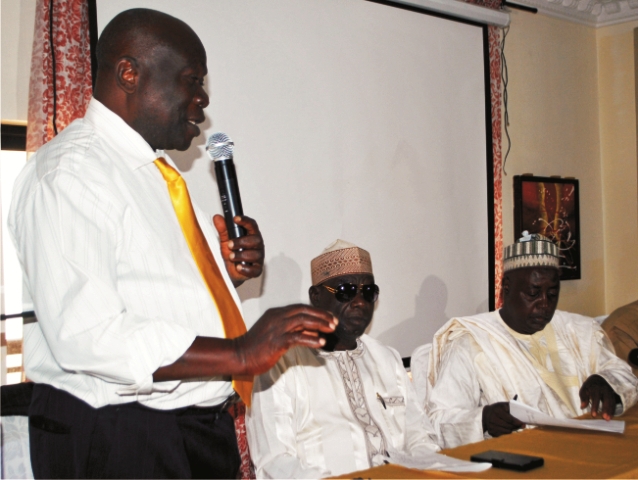Business
NUPENG’s Strike:Motorists Hail Wike’s Intervention

Some motorist in Port
Harcourt have commended the Rivers State Government for its intervention in the labour crisis between the National Union of Petroleum and Natural Gas Workers (NUPENG) and some oil companies in the state which led to the suspension of the union’s one-week strike in both Rivers and Bayelsa States.
A taxi driver Mr Nathan Columbus, said the intervention of the Governor was timely to save the people from the negative effects of the strike.
Columbus explained that a litre of fuel was sold at N250 by black marketers as filling stations closed their gates to customers.
“The scarcity created by the NUPENG strike was regrettable because of the hardship motorists suffered. One had no option than to patronise the black marketers”, said Columbus.
Mr Ernest Ajagbaonwu also praised Governor Nyesom Wike for his intervention saying, “what makes a good leader is his sensitivity to the feelings of those he leads.
“As a taxi driver, I cannot fully explain the hardship I passed through because, few filling stations that managed to sell within the strike period were exploiting people and at the black market, a litre was sold at between N200 and N250. So I thank the Governor for intervening on the issue”.
A hotelier Prince George Clifford, said, “you know that these days you cannot expect reasonable supply of public power, so anything that affects petrol or diesel affects my business directly.
Clifford appealed to NUPENG and the oil firms involved to consider the hardship people passed through because of their actions and resolve the matter completely.
He expressed regret that each time the oil workers union have problems with their employers, they embark on industrial action which negatively affects the businesses of innocent citizens of the country.
Another respondent, Ebuka Smith, described the action of the governor as a good step saying the strike might have otherwise lingered thereby causing more hardship to residents of Rivers and Bayelsa State.
“I don’t actually know the issues involved in the strike but the way people suffered was bad. Imagine the scarcity the strike caused innocent Nigerians and the attendant hike in price of fuel by black marketers who were looking for the slightest possible opportunity to exploit the people”.
It would be recalled that the Rivers and Bayelsa States branch of NUPENG had declared strike to protest the alleged illegal sacking of their members by three oil communities . As a result of the protest all the filling stations and depots in the two states were directed to stop operations by the Union.
However, Rivers State, Government mediated between the two parties through the office of the Commissioner for Energy and Natural Resources, Port Harcourt.
The intervention led to the suspension of the strike on Monday June 20, while discussion continues till today.
Chris Oluoh
Business
Kenyan Runners Dominate Berlin Marathons
Kenya made it a clean sweep at the Berlin Marathon with Sabastian Sawe winning the men’s race and Rosemary Wanjiru triumphing in the women’s.
Sawe finished in two hours, two minutes and 16 seconds to make it three wins in his first three marathons.
The 30-year-old, who was victorious at this year’s London Marathon, set a sizzling pace as he left the field behind and ran much of the race surrounded only by his pacesetters.
Japan’s Akasaki Akira came second after a powerful latter half of the race, finishing almost four minutes behind Sawe, while Ethiopia’s Chimdessa Debele followed in third.
“I did my best and I am happy for this performance,” said Sawe.
“I am so happy for this year. I felt well but you cannot change the weather. Next year will be better.”
Sawe had Kelvin Kiptum’s 2023 world record of 2:00:35 in his sights when he reached halfway in 1:00:12, but faded towards the end.
In the women’s race, Wanjiru sped away from the lead pack after 25 kilometers before finishing in 2:21:05.
Ethiopia’s Dera Dida followed three seconds behind Wanjiru, with Azmera Gebru, also of Ethiopia, coming third in 2:21:29.
Wanjiru’s time was 12 minutes slower than compatriot Ruth Chepng’etich’s world record of 2:09:56, which she set in Chicago in 2024.
Business
NIS Ends Decentralised Passport Production After 62 Years
Business
FG To Roll Out Digital Public Infrastructure, Data Exchange, Next Year
-
Sports4 days ago
CAFCL : Rivers United Arrives DR Congo
-
Sports4 days ago
FIFA rankings: S’Eagles drop Position, remain sixth in Africa
-
Sports4 days ago
NPFL club name Iorfa new GM
-
Sports4 days ago
NNL abolishes playoffs for NPFL promotion
-
Sports4 days ago
NSF: Early preparations begin for 2026 National Sports Festival
-
Sports4 days ago
Kwara Hopeful To Host Confed Cup in Ilorin
-
Sports4 days ago
RSG Award Renovation Work At Yakubu Gowon Stadium
-

 Politics4 days ago
Politics4 days agoRivers Assembly Resumes Sitting After Six-Month Suspension

